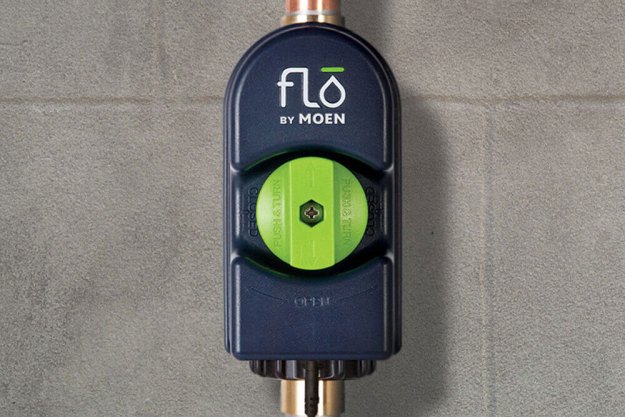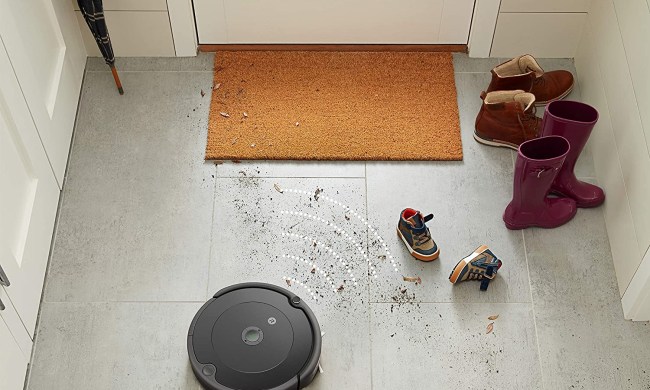
- Protects from catastrophic water damage
- Learns your water-use habits
- Provides valuable water-use info
- Great informational dashboard
- Integrates with Amazon Alexa
- Requires subscription for important benefits
- Can’t detect location of leak
- Doesn’t tie in with any other home security systems
My first product review was of the ENVI home energy monitor made by Current Cost. That was nine years ago, and since then I’ve been neck deep in TV reviews — but I’ve never gotten over having energy and resource usage data at my fingertips. I still geek out over it. So, when the folks behind the Flo by Moen smart home water monitor (and leak detector, too!) offered to install the device for the purpose of this review, I jumped at the chance.
It’s now several months later, and I often wonder how I ever lived without this clever gadget. Sure, it will detect a water leak, let you know about it, and even shut off your water main, but its abilities range far beyond those basic functions. It’s not perfect, but between the practical daily use I’ve experienced and the security it provides, I wholeheartedly recommend it.
Mother Earth will surely appreciate this, because not only is there an incentive to save money by having Flo by Moen in place, but there’s also the more profound gesture of helping out the planet by saving on water.
Why do I need this thing?
Over the past two months, three of my homeowning friends have had plumbing issues that resulted in flooded properties. Those who had good insurance were met with a nasty deductible, the one who didn’t received a nasty bill, and in all cases the total cost of cleanup, repairs, and restoration exceeded $4,000.

In all three cases, the $500 Flo by Moen could have ensured virtually none of that flooding and damage ever happened. That could be reason enough to invest in Flo by Moen. But it also monitors for leaks and, for a small monthly fee, identifies the water-using appliances and fixtures in your home, thereby giving you insight — shower by shower, flush by flush, and even washer load by washer load – into your home’s water use. In all cases, there’s real money to be saved, and not just a drop in the bucket. Over its lifetime, the Flo by Moen could potentially save you thousands of dollars.
There’s also the environmental good of water conservation, which shouldn’t be undervalued.
Installation
Flo by Moen is a small, weatherproof box with a valve knob and incoming and outgoing connections that attaches to your home’s main water line. Handy folks can install it themselves, but I would suggest hiring a plumber, especially if your water main is hard to access. While you’re contacting your plumber, you might as well see if they sell Flo by Moen, as they might offer a discount for purchasing the product and installation together.
There will come a time that you must help the Flo better help you.
Flo by Moen is not battery-powered, so you’ll need access to a power outlet. Also, you’ll want to make sure your Wi-Fi router’s signal is powerful enough to get to wherever the device is installed because there’s no Ethernet port (not that one would likely run an Ethernet cable to their water main anyway).
Once plugged in, you’ll get Flo by Moen connected to Wi-Fi using the Flo by Moen app, available for iOS and Android. Once online, you’ll be asked a series of questions by the app to get things started. The app will want to know where your home is located, how many people live in the home, price per unit of water — all data it can use to give you meaningful and informative dashboards.
From there, Flo by Moen is going to start paying attention to water use in the home and sending that data to the cloud for processing through Flo by Moen’s analytics.
What Flo does
Over the course of its first few days of operation, the Flo gathers some baseline data: How much water is consumed per day, when the consumption is heaviest and lightest, what the flow rate looks like with typical water usage, and what the home’s water pressure and temperature measure on average. The Flo will also begin nightly tests for minor leaks, which it does by briefly shutting off your water supply and monitoring for pressure changes – if the pressure goes down, there’s a leak somewhere. The Flo stops short of detecting where the leak is – it’s smart, but it doesn’t have sensors deployed throughout one’s plumbing system – so you’ll have to go hunting yourself or call a plumber and have them sniff it out.

With a sense for what is normal around your home, the Flo is thereby equipped to understand what is not normal. If it sees what it believes is excess water usage, it will send a notification via text message, email, and/or phone call (you can opt into one or all three notification options) to make you aware. If there is no response to notifications, Flo will turn off the water, presuming it is preventing potentially catastrophic damage or water loss. If you prefer, you can have Flo ignore the alert for two hours – something I had to do many, many times. More on that later.
The Flo by Moen also looks for low pressure, indicating there may be a problem with the water coming into your home; excessively low water temperatures, which can be a warning that pipes may freeze; or excessively high pressure, which could be a sign of multiple problems (including pipes that have already frozen).
For those headed out on vacation or for some other extended absence, an “away” mode is available, which will cause the Flo to react more quickly to alert signals.
But how does it really work, though?
Everything I’ve described so far is essentially automated, but there will come a time (likely many times, actually) when you must help the Flo better help you. Yes, for as smart as the Flo is, it still needs some insight into what is actually happening in your home.
For example, watering my garden and/or lawn was a confounding event for the Flo to handle. I must admit I was shocked that some soaker hoses allow as much as 5 gallons of water per minute to pass through. But, more importantly, Flo had never seen that rate of water use at my home before – at least not for very long. So, while half of my vegetable garden was soaking in some much-needed hydration, Flo got busy letting me know some nefarious stuff was going down and warned of imminent water shutdown.
Flo isn’t just protecting my home from potential damage — it is preventing me from overspending.
This scenario repeated itself several times, but little did I know that each time I told the Flo app not to worry and to continue watering, Flo was raising the ceiling for a shutoff event. Initially, this brought me some concern, because what if it raised the ceiling so high as for the Flo to be ineffective in the event of a real problem? Turns out, that wasn’t something I needed to be concerned with.
In addition to learning use habits in real time, the Flo system allows users to assign usage events to certain usage types, but only with a $5 FloProtect subscription. With the subscription, it is possible to specify that the water use at 1:10 p.m. on Thursday was the washing machine, from which the Flo will likely learn to properly attribute the water use. For me, this came in handy, as I was able to essentially tell the Flo device which uses were for irrigation.
Today, I must blast through a good 57 gallons over the course of 11 minutes before Flo warns me that I’m basically overwatering my garden. In this case, the Flo isn’t just protecting my home from potential damage, it is preventing me from overwatering and, therefore, overpaying when the water bill comes around.
I’ve got a huge bag of anecdotes extolling the value of the Flo by Moen device, including tales of insanely long teenage showers cut short at 25 minutes and narrowly averted overflowing bathtubs, but I think you can well imagine all kinds of instances in which having a water monitor could come in handy. Let’s now move on to an even more compelling topic.
Get ready to save $$$
It may be a good while before I can buy a used car with the money I’ve saved using the Flo by Moen, but I’m pretty convinced that day could come. There are some real savings opportunities here.
Like any dashboard, the Flo by Moen app can be one heck of a motivator. By setting water-usage goals and seeing reports on whether you made or missed your target, you tend to alter your behavior (and that of those around you). In addition, seeing just how much water is used for, say, washing clothes versus taking showers is revealing – and in some cases shocking – in a way that is difficult to describe.
“No way are we dumping that many gallons down our sinks,” I shouted in horror after checking my first monthly report. Alas, our faucets were our chief consumption offenders. They still are, but to a much lesser degree now that I’ve installed water-saving aerators on every faucet in the house. To be honest, I thought the aerators in place were high-efficiency, and I never would have known otherwise without some detailed insight into my water use.

As compelling as saving money may be, I think it is perhaps more important to consider the positive environmental impact water conservation has on our planet. Without realizing it, my kids had gotten a little lazy about turning off the faucet while brushing their teeth and, frankly, it turns out I was wasting a horrendous amount of water while cleaning dishes.
Treat the Flo by Moen app as a sort of game, and conservation becomes a contest to see who can save the most water. Given its high potential for saving a precious and sometimes scarce resource, I decided to endow the Flo by Moen with Digital Trends’ Tech for Change award.
What’s the catch?
The downside to many of the Flo’s benefits is that they live behind a FloProtect subscription paywall costing $5 monthly or $60 annually. With the subscription, you also get an insurance reimbursement of up to $2,500 if any water damage loss occurs under the Flo’s watch, which seems like a nice addition, but I would rather see Moen toss in this kind of support for the device’s $500 purchase price.
So long as I’m groaning, it would be great to see the Flo by Moen integrate with larger security systems for an added layer of protection. I personally have a Vivint home security system in operation, which features flood sensors that could potentially detect water accumulation that the Flo can’t detect on its own through usage data. As it stands, though, the Flo stands alone in its operation.
Our Take
I love having the Flo by Moen as part of my increasingly smart home. Not only do I feel like I have an added layer of protection, but I am still moved by all the data I can get through well-designed dashboards. It takes a little hand-holding in the beginning, but the end result is an intuitive smart water-monitoring system thatmore or less takes care of itself.
Is there a better alternative?
There are less expensive options, like the $200 Stream Labs Smart Home Water Monitor, which doesn’t require any pipe cutting like Flo by Moen does, but we can’t vouch for its accuracy. There are also more expensive options, like the $700 Phyn Plus, but it is unclear what, if any, valuable advantages come with the higher sticker price – plus we prefer the look and feel of Flo by Moen’s user interface.
How long will it last?
The Flo by Moen seems very ruggedly built and is weatherproof, so signs that it will last are good. However, given this is a new product category, it remains to be seen what a realistic life expectancy will be. Also, given that most of the computing and analytics are done in the cloud, there’s a good chance the technology won’t become outdated in the near term.
Should you buy it?
Yes. It performs well and offers a wealth of accurate data, as well as solid protection.




